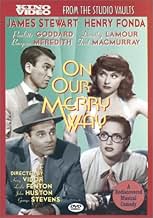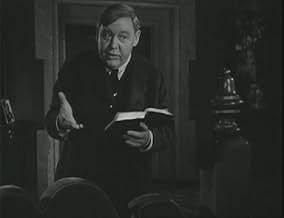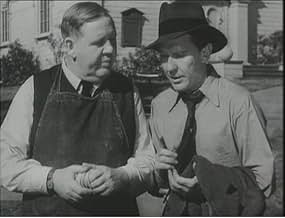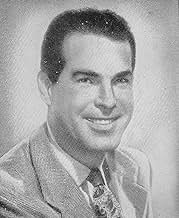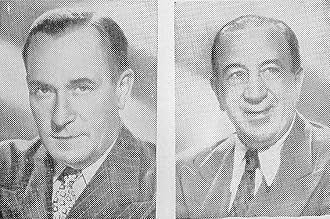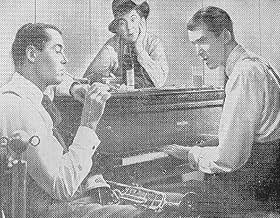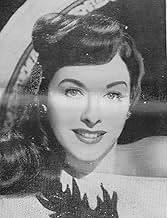NOTE IMDb
5,7/10
940
MA NOTE
Ajouter une intrigue dans votre langueThree short stories revolving around the topic of the daily question posed by the roving reporter to the readers of a daily newspaper.Three short stories revolving around the topic of the daily question posed by the roving reporter to the readers of a daily newspaper.Three short stories revolving around the topic of the daily question posed by the roving reporter to the readers of a daily newspaper.
Carl 'Alfalfa' Switzer
- Leopold 'Zoot' Wirtz
- (as Carl Switzer)
Avis à la une
Down-on-his-luck newspaper ad-man, working the lost-and-found desk, creates a reporting opportunity for himself wherein he polls everyday citizens with an innocuous yet potentially interesting question, "What affect has a child had on your life?" (this is immediately rectified to 'baby' when posed to two jazz musicians). In the prologue, co-producer and star Burgess Meredith is awfully pushy trying to ingratiate himself to the audience; he and Paulette Goddard make for a curious married couple (to say the least), but they're not around enough to cause too much damage. Still, this overlong compendium involving stammering music-partners, a would-be movie actress, and two traveling showmen fails to touch upon anything personal or provocative. It is initially nice to see Henry Fonda and James Stewart sharing the screen, yet their comedic episode is silly and annoying. Production vales high, cast is game, but there are so few laughs that one may think the filmmakers were actually trying for something meaningful. Sadly, there is no substance or depth on display. *1/2 from ****
Before I committed to buying the DVD of "On Our Merry Way," I got it from Netflix and happy I am that I did so, for it's not likely I'd ever want to watch it again. "On Our Merry Way" is an anthology film in the manner of "O. Henry's Full House," but while the latter has a no-nonsense framework with John Steinbeck introducing the episodes, "On Our Merry Way" uses the gimmick of Burgess Meredith talking directly to the camera every so often. It doesn't work; it seems more like a vanity project for Meredith and his then wife Paulette Goddard.
Nor do the stories work. They are shaggy dog stories that bore you long before they reach a conclusion. The Henry Fonda-James Stewart and Fred MacMurray-William Demarest episodes are simply not funny. "On Our Merry Way" is full of overacting (especially from Carl "Alfalfa" Switzer) and shtick (from Victor Moore and Hugh Herbert). Dorothy Lamour, on the other hand,comes off extremely well both as an addle-pated secretary and then with a song that satirizes her own career; for Lamour it's a triumph over inferior material.
John O'Hara is credited for one of the stories, O. Henry is not, even though his "The Ransom of Red Chief" serves as the basis for the MacMurray-Demarest episode; for comparison, watch the Fred Allen-Oscar Levant take on the same story in "O. Henry's Full House." It's only minimally better but it moves faster.
It's inconceivable to me that so many great directors, credited or un-, would produce such a mess.
One can't help be grateful to Kino for clearing the copyright problems which had long kept the film in limbo; after all, we do want to preserve the work of our great stars, no matter how bad. But once our curiosity is satisfied, "On Our Merry Way" becomes a shelve-it-and-forget-it film.
For a much better pairing of Meredith and Goddard, I'd recommend Jean Renoir's English-language version of "The Diary of a Chambermaid."
Nor do the stories work. They are shaggy dog stories that bore you long before they reach a conclusion. The Henry Fonda-James Stewart and Fred MacMurray-William Demarest episodes are simply not funny. "On Our Merry Way" is full of overacting (especially from Carl "Alfalfa" Switzer) and shtick (from Victor Moore and Hugh Herbert). Dorothy Lamour, on the other hand,comes off extremely well both as an addle-pated secretary and then with a song that satirizes her own career; for Lamour it's a triumph over inferior material.
John O'Hara is credited for one of the stories, O. Henry is not, even though his "The Ransom of Red Chief" serves as the basis for the MacMurray-Demarest episode; for comparison, watch the Fred Allen-Oscar Levant take on the same story in "O. Henry's Full House." It's only minimally better but it moves faster.
It's inconceivable to me that so many great directors, credited or un-, would produce such a mess.
One can't help be grateful to Kino for clearing the copyright problems which had long kept the film in limbo; after all, we do want to preserve the work of our great stars, no matter how bad. But once our curiosity is satisfied, "On Our Merry Way" becomes a shelve-it-and-forget-it film.
For a much better pairing of Meredith and Goddard, I'd recommend Jean Renoir's English-language version of "The Diary of a Chambermaid."
¨A Miracle Can Happen" was the original title of this film , it deals with a down-and-out reporter called Oliver Pease (Burguess Meredith) gets a dose of courage from his wife Martha (Paulette Goddard) as she suggests him an interesting inquiry : "Has a little child ever changed your life?" . Oliver gets answers from two slow-talking musicians (Henry Fonda and James Stewart) , the second sequence Charles Laughton played a bible-reading minister , and the third part about an itinerant couple (Fred MacMurray , William Demarest) who is deceived by a child . In each case the "little child" is hardly innocent: in the first, a local auto mechanic's "baby" results out to be fully developed as a beautiful girl ; in the second , an unfortunate church Minister (Charles Laughton) teaches a grumpy father (Henry Hull) to learn kindness by Bible reading ; in the third, the family of a spoiled brat doesn't want him returned . Did You Ever See A Miracle Walking?
This is a sketches movie full of humor , fun situations , entertainment and amusement . Interesting screenplay by Laurence Stallings and Lou Breslow based on original story by Arch Oboler . The picture is made up of many vignettes featuring many capable stars , it belongs to sub-genre about ¨anthology film¨ ; movies like "Flesh and Fantasy" and "O. Henry's Full House" used large casts to tell several interlocked stories , though "Tales of Manhattan" is the best of the anthology films , it follows the adventures of a tuxedo's tailcoat as it passes through the hands of several diverse people , being also starred by Laughton and Fonda . This ¨A miracle can happen¨ consisted of three short stories , about 20-25 minutes each , linked by the Burgess Meredith character. Titled "A Miracle Can Happen", this film debuted on February 3, 1948 at the Warner Theatre in Manhattan , during February, the feature also opened in Philadelphia and Detroit ; in June, when released nationally, the picture ran nine minutes shorter than its original 107 minutes, and the film's name had been changed to "On Our Merry Way," thus avoiding any religious connection that moviegoers might assume by seeing the word "miracle" in the title . Nice acting by Burguess Meredith as a misfit journalist pursued by a creditor , he writes lost pet notices and looking for a good scoop he tricks the editor of the newspaper . Sensational duo formed by Henry Fonda and James Stewart , they are fabulous as an amusing couple become involved into a funny contest . Charles Laughton plays masterfully an unlucky Minister ; however, this segment was eliminated in some copies with a parody of an actress whose roles usually feature a sarong as Dorothy Lamour's South Seas movies , as the powers-that-be decided to drop this 'religious' story altogether and it was replaced by a more comic one . Independent producer David O. Selznick offered to buy the film in order to issue the Laughton sequence as a short, scrapping the rest of the picture ; Selznick's plan was rejected by producer Benedict Bogeaus and producer-star Burgess Meredith . In Spain, "A Miracle Can Happen", complete with the original Laughton sequence intact but of course without the alternative Dorothy Lamour story , as it has been released on DVD there, and retains the English-language soundtrack, the movie can now been seen as it was originally intended .
Extraordinary support cast formed by notorious secondaries such as Harry James , Victor Moore , William Demarest , Hugh Herbert , Eduardo Ciannelli , Henry Hull , John Qualen and Carl 'Alfalfa' Switzer . The film has an atmospheric cinematography carried out by four prestigious cameramen as Joseph F. Biroc , Edward Cronjager , John F. Seitz and uncredited Ernest Laszlo . Evocative and appropriate original musical score by Heinz Roemheld . The motion picture was well directed by four classic Hollywood filmmakers as King Vidor, Leslie Fenton and, uncredited, John Huston and George Stevens . Rating : Good film , 6'5/10 .Well worth watching .
This is a sketches movie full of humor , fun situations , entertainment and amusement . Interesting screenplay by Laurence Stallings and Lou Breslow based on original story by Arch Oboler . The picture is made up of many vignettes featuring many capable stars , it belongs to sub-genre about ¨anthology film¨ ; movies like "Flesh and Fantasy" and "O. Henry's Full House" used large casts to tell several interlocked stories , though "Tales of Manhattan" is the best of the anthology films , it follows the adventures of a tuxedo's tailcoat as it passes through the hands of several diverse people , being also starred by Laughton and Fonda . This ¨A miracle can happen¨ consisted of three short stories , about 20-25 minutes each , linked by the Burgess Meredith character. Titled "A Miracle Can Happen", this film debuted on February 3, 1948 at the Warner Theatre in Manhattan , during February, the feature also opened in Philadelphia and Detroit ; in June, when released nationally, the picture ran nine minutes shorter than its original 107 minutes, and the film's name had been changed to "On Our Merry Way," thus avoiding any religious connection that moviegoers might assume by seeing the word "miracle" in the title . Nice acting by Burguess Meredith as a misfit journalist pursued by a creditor , he writes lost pet notices and looking for a good scoop he tricks the editor of the newspaper . Sensational duo formed by Henry Fonda and James Stewart , they are fabulous as an amusing couple become involved into a funny contest . Charles Laughton plays masterfully an unlucky Minister ; however, this segment was eliminated in some copies with a parody of an actress whose roles usually feature a sarong as Dorothy Lamour's South Seas movies , as the powers-that-be decided to drop this 'religious' story altogether and it was replaced by a more comic one . Independent producer David O. Selznick offered to buy the film in order to issue the Laughton sequence as a short, scrapping the rest of the picture ; Selznick's plan was rejected by producer Benedict Bogeaus and producer-star Burgess Meredith . In Spain, "A Miracle Can Happen", complete with the original Laughton sequence intact but of course without the alternative Dorothy Lamour story , as it has been released on DVD there, and retains the English-language soundtrack, the movie can now been seen as it was originally intended .
Extraordinary support cast formed by notorious secondaries such as Harry James , Victor Moore , William Demarest , Hugh Herbert , Eduardo Ciannelli , Henry Hull , John Qualen and Carl 'Alfalfa' Switzer . The film has an atmospheric cinematography carried out by four prestigious cameramen as Joseph F. Biroc , Edward Cronjager , John F. Seitz and uncredited Ernest Laszlo . Evocative and appropriate original musical score by Heinz Roemheld . The motion picture was well directed by four classic Hollywood filmmakers as King Vidor, Leslie Fenton and, uncredited, John Huston and George Stevens . Rating : Good film , 6'5/10 .Well worth watching .
This odd, freewheeling, independently-made compendium film emerges as little more than a glorified home movie (despite the considerable talent involved) but is certainly watchable and entertaining in itself. The linking narrative revolves around married couple Burgess Meredith and Paulette Goddard (at the time hitched in real life): she's an artist and he a lowly employee with a newspaper aspiring to be a journalist; while attempting to flee a creditor, he meets and interviews a number of people about the influence of children in their lives.
The three 'stories' are quite nice with all the various performers contributing generous and relaxed cameos: the first concerns down-and-out musicians Henry Fonda and James Stewart and their involvement in an instrumental contest taking place in a small town (they're all too ready to appease the mayor who has promised them a lot of money if his son is allowed to win but, thanks to the intervention of trumpeter Harry James, a multi-talented girl emerges the clear winner and eventually becomes the owner of Fonda and Stewart's band!); the second finds Dorothy Lamour parodying her former image of a sarong girl (she's a bit player whose opportunity for stardom finally arises out of a disastrous stint in a vehicle for a spoilt child star); the last story, reminiscent of O. Henry's "The Ransom Of Red Chief" (later filmed by Howard Hawks), involves ex-con magician Fred MacMurray and how he and his partner William Demarest stumble upon a boy in the woods and are continually outwitted by him (he's actually fleeing from his eccentric banker uncle but MacMurray eventually discovers his true identity and, in the end, the boy and his elder sister join in on the magic act).
The three 'stories' are quite nice with all the various performers contributing generous and relaxed cameos: the first concerns down-and-out musicians Henry Fonda and James Stewart and their involvement in an instrumental contest taking place in a small town (they're all too ready to appease the mayor who has promised them a lot of money if his son is allowed to win but, thanks to the intervention of trumpeter Harry James, a multi-talented girl emerges the clear winner and eventually becomes the owner of Fonda and Stewart's band!); the second finds Dorothy Lamour parodying her former image of a sarong girl (she's a bit player whose opportunity for stardom finally arises out of a disastrous stint in a vehicle for a spoilt child star); the last story, reminiscent of O. Henry's "The Ransom Of Red Chief" (later filmed by Howard Hawks), involves ex-con magician Fred MacMurray and how he and his partner William Demarest stumble upon a boy in the woods and are continually outwitted by him (he's actually fleeing from his eccentric banker uncle but MacMurray eventually discovers his true identity and, in the end, the boy and his elder sister join in on the magic act).
Interesting story that doesn't know where it wants to go - I won't be as harsh on this film as other posters. That's perhaps because I know a little about the personal lives of two of it's stars, Burgess Meredith and Paulette Goddard. I just watched this on Kino's DVD. It's one of those rare films with multiple directors and long thought lost. Burgess Meredith and Paulette Goddard get things started for us n the opening and make a cute couple(they were married in real life at the time) and she calls him Oliver, Meredith's real life first name. Meredith plays a newspaper guy and for some reason asks the question "has a child made a difference in your life?" He is IMO trying to get an answer to make something tick for his newspaper article and/or for personal reasons ??. Though this is a scripted film the question, one get's the feeling, is a personal one for Meredith and Goddard, for in real life in 1944 Goddard suffered a miscarriage of their child, probably devastating to both of them. Unless you know that bit of trivia you won't pay but fleeting attention to the conversation between Burgess and Paulette. As stated in the summary this film has to be one of the first motion pictures to show a husband and wife sleeping together in the same bed, which is impressive considering the Breen Production Code in effect at the time. Married couples however would continue to sleep in twin beds until TV shows like The Brady Bunch in the late 1960s. The film pairs off into too many directions first with James Stewart and Henry Fonda, then with Fred MacMurray and William Demarest. Stewart and Fonda were friends in real life and that holds something for fans of the pair but their story is aimless. The duo put on a variety show reminiscent of today's American Idol. MacMurray and Demarest would famously work together again in the mid 60s on My Three Sons, after Demarest replaced William Frawley who became ill and died. MacMurray and Demarest have their comic moments especially with a precocious(in a bad way) little boy called "Sniffles". Demarest is too old for the kind of physical slapstick he's subjected to here. All in all another aimless scene. Dorothy Lamour shows up as a cutie who later dons a sarong in a musical revue. A voluptuous piece of cheesecake, famous for playing the island girl in the Crosby-Hope 'Road' pictures, her stay is all too short. This film should have stayed focused on the interesting beginnings with Meredith and Goddard. Meredith himself is not involved enough in the linking stories to make the finale cohesive. He finds what ever answer/lesson he's looking for but the audience has been shuttled from one minor point to the next. Paulette at the close of the film reveals that she's pregnant(only in the story) and she and Meredith rejoice at end. Their story should have been the main focus of the film and dare the subject of talking about pregnancy which I get at the conclusion that that's what the story was about. Instead we're taken from one inconsequential story to the next without logical tie-in to Meredith and Goddard. That's why I think so many people miss the point and poo-poo the film. But if you know the different junctures of the film especially the part with Burgess Meredith and Paulette Goddard you should be able to enjoy the picture.
Le saviez-vous
- Anecdotes"A Miracle Can Happen" was the original title of this film when released on Feb. 3, 1948 at the Warner Theater in Manhattan. It consisted of three short stories (about 20-25 minutes each) linked by the Burgess Meredith character. He played a reporter looking for a good scoop, and in the second sequence, Charles Laughton played a bible-reading minister. When it was released nationally in June, however, it had been decided that the religious story would be dropped and replaced by a more comic one featuring Dorothy Lamour. The film in this new version was then re-titled "On Our Merry Way". However, prints of the original film had already been sent abroad for dubbing. In Spain, "A Miracle Can Happen" became "Una Encuesta Llamada Milagro", complete with the original Laughton sequence intact (but without the alternative Lamour story). As it has been released on DVD there and retains the English-language soundtrack, the movie can be seen as it was originally intended.
- Versions alternativesThe version released in Spain and always seen on both TV and DVD, in dubbed and subtitled versions (bearing the title card "A Miracle Can Happen"), includes the Charles Laughton episode but not the Dorothy Lamour one.
- ConnexionsFeatured in Henry Fonda: The Man and His Movies (1982)
Meilleurs choix
Connectez-vous pour évaluer et suivre la liste de favoris afin de recevoir des recommandations personnalisées
- How long is On Our Merry Way?Alimenté par Alexa
Détails
- Durée
- 1h 47min(107 min)
- Couleur
- Rapport de forme
- 1.37 : 1
Contribuer à cette page
Suggérer une modification ou ajouter du contenu manquant

